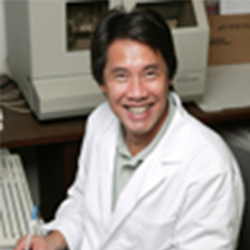Steven Lee, Ph.D.

Professor
Ph.D., University of California, Berkeley; Berkeley, CA
Contact Information:
Email: steven.lee@sjsu.edu
Phone:408-924-2946
Office: MH 528
Office Hours:
Spring 2023 Office Hours (TBA)
About Dr. Steven Lee:
Professor Lee holds a B.S. from SUNY Binghamton in Biology, an M.S. from NYU, and a Ph.D. from the University of California, Berkeley, in Molecular Biology. Dr. Lee is also a Visiting Scholar at UC Berkeley and frequently serves as a consultant or trainer in forensic DNA. He was formerly the Director of R&D at the California Dept of Justice DNA Laboratory from 1994-2000, where he served as an expert witness in DNA, spearheaded the implementation of robotics for sample processing, DNA extraction, and STR amplification, and conducted DNA training courses. He is a Fellow in the Criminalistics section of the American Academy of Forensic Sciences and a full member of the California Association of Criminalists, the American Association for the Advancement of Science, and the National Science Teachers Association. He is qualified as an American Society of Crime Laboratory Director’s Laboratory Accreditation Board inspector. He has taught courses in molecular biology at SFSU (1996-1998), Forensic genetics at UC Davis (1997), forensic DNA Typing of STRs at FIU (2003), Criminalistics, Forensic Science, DNA and Crime, Genetics Law and Society and Forensic Molecular Biology at SJSU.
Teaching and Research Interests
Forensic molecular biology is the molecular analysis of biological evidence to provide objective information on legal matters or those that pertain to criminal and civil law. Comparison of DNA profiles generated from the biological evidence to known samples can serve to link suspects with crime scenes or victims, exonerate the suspect, find the missing and aide investigations in human rights. Our research is highly interdisciplinary with Biology and Chemistry, focusing on advancing and enhancing forensic molecular tools and techniques to examine and characterize biological evidence.
Recent projects include:
- Optimizing fluorescent detection of semen stains
- Comparison of DNA recovery from Molotov cocktails following 6 fire suppression strategies
- Investigation of strategies to reduce PCR inhibition due to commonly found co-extracted inhibitors to PCR
- Development, implementation and validation of room temperature DNA storage using novel polymers
- Evaluation and testing of Next Generation Sequencing technology for forensic DNA identity, phenotype, ancestry,and health genomics
- Digital and cyber forensics
- The interface of forensic science and human rights.
My main teaching goal is to inspire students to a life of continual scientific learning, discovery and practice, to serve justice. Courses that are offered combine rigorous, scientific principles and concepts, hands-on learning in a collaborative team environment, while also emphasizing the applications and practical implications of the sciences to serve justice. I strive to create an environment to inspire students to become scientifically literate, with critical thinking skills that will assist them in their future occupations. Many of our graduates have gone onto graduate school in forensic science, biology and chemistry as well as being employed in local, regional and national crime laboratories, industry and academia.
Areas of Interest:
- Introduction to Forensic Science
- Forensic Molecular Biology
- Fluorescent applications in Forensic Science
- Forensic and Investigative Biometrics
- Genetics, Law and Society
Recent Publications:
McCord, B.R., Quentin Gauthier, Sohee Cho, Meghan N. Roig, Georgiana C. Gibson-Daw, Brian Young, Fabiana Taglia, Sara C. Zapico, Roberta Fogliatto Mariot, Steven B. Lee, and George Duncan. 2019. Forensic DNA Analysis. Analytical Chemistry 2019 91 (1), 673-688. DOI: 10.1021/acs.analchem.8b05318.
White, TJ and SB Lee. 2019. Genetics, Ethics and Privacy. Chapter 15 in Erlich, H. Stover, E and White, T.eds. Silent Witness: Applying Forensic DNA Evidence in Criminal Investigations and Humanitarian Disasters. Oxford University Press (OUP). In Press.
Lee, SB, De Etta Mills, SA Morse, SE Schutzer, B Budowle and PS Keim. 2018. Training and Education in Microbial Forensics. Chapter 41 in Microbial Forensics. SA Morse, SE Schutzer, B Budowle eds. Elsevier Academic Press. Invited chapter submitted 12/14/2018. Under Review
McCord BR and SB Lee. 2018. Novel Applications of Massively Parallel Sequencing (MPS) in forensic analysis. Editorial. Special Issue of Electrophoresis. McCord, BR and SB Lee. Eds. Nov;39(21):2639-2641. doi: 10.1002/elps.201870175.
McCord BR and SB Lee. Editors. 2018. Novel Applications of Massively Parallel Sequencing (MPS) in forensic analysis. Special Issue of Electrophoresis. Electrophoresis. Volume 39, Issue 21 Pages: 2633-2833